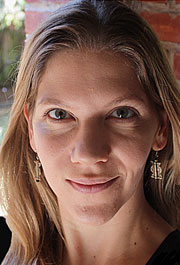The benefits, costs and limits of free speech as well as the social consequences when the limits of free speech are violated will be examined in a Lawrence University presentation.

Cathy Buerger, a research and communications associate with the Dangerous Speech Project, presents “Dangerous Speech: A Global Perspective” Monday, Jan. 29 at 7 p.m. in the Warch Campus Center cinema. The event is free and open to the public.
Any form of expression — speech, text or images — that has the potential to increase the risk that its audience will condone or participate in violence against members of another group is considered dangerous speech. The term grew out of observations that divisive rhetoric rises steadily before outbreaks of mass violence. The dangerous speech often is similar regardless of country, culture or historical period.
Buerger, who serves as managing editor of the Journal of Human Rights, joined the Dangerous Speech Project last September. Her research with the DSP focuses on global responses to dangerous and hateful speech as well as the process of identity formation among those who choose to respond to such speech.
Beyond her work with the DSP, Buerger is also a research affiliate with the Economic and Social Rights Research Group at the University of Connecticut, where she earned a Ph.D. in anthropology.
Buerger’s appearance is part of the Povolny Lecture Series in International Studies. Named in honor of long-time Lawrence government professor Mojmir Povolny, the series promotes interest and discussion on issues of moral significance and ethical dimensions. It is presented in collaboration with the office of diversity and inclusion.
About Lawrence University
Founded in 1847, Lawrence University uniquely integrates a college of liberal arts and sciences with a nationally recognized conservatory of music, both devoted exclusively to undergraduate education. It was selected for inclusion in the book “Colleges That Change Lives: 40 Schools That Will Change the Way You Think About College.” Engaged learning, the development of multiple interests and community outreach are central to the Lawrence experience. Lawrence draws its 1,500 students from nearly every state and more than 50 countries.